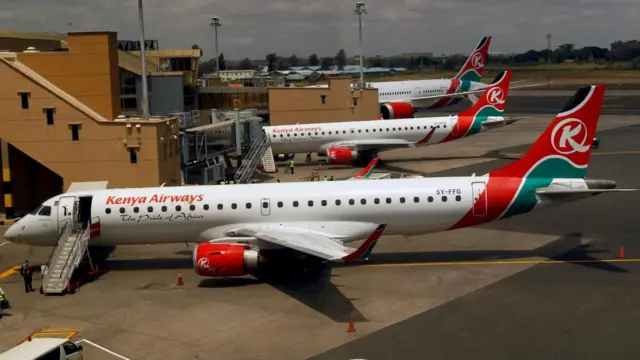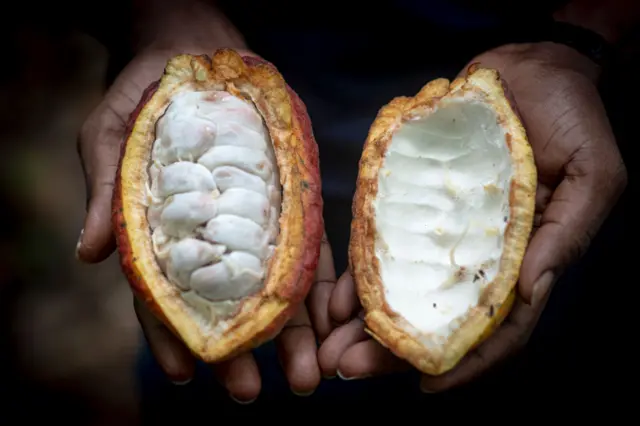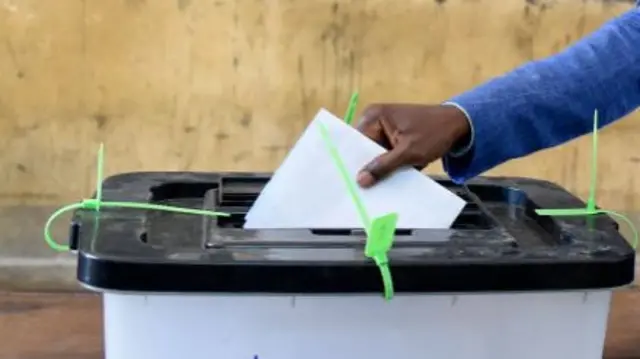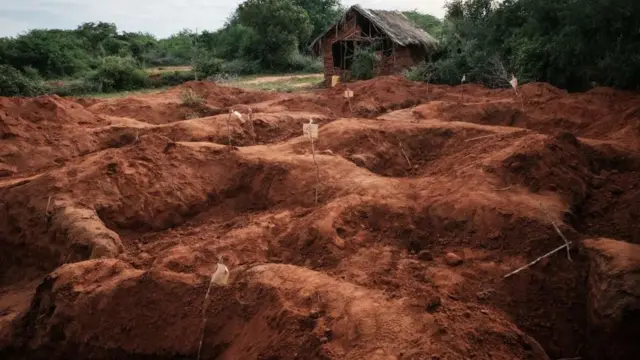Ex-Sierra Leone defender Bangura dies in bus crashpublished at 16:46 GMT 27 March 2024
Former Sierra Leone international Lamin Bangura dies aged 59 after a road accident in the West African nation.
Read MoreFormer Sierra Leone international Lamin Bangura dies aged 59 after a road accident in the West African nation.
Read MoreMalam Bacai Sanha Jr smuggled drugs to fund a coup in Guinea-Bissau, US authorities say.
Read MoreChad beat Mauritius in preliminary qualifying for the 2025 Africa Cup of Nations as Eswatini, Liberia and South Sudan also go through.
Read MoreSome 13,000 students are stranded at the four colleges, accused of fabricating exam results.
Read MoreAfter a decade-long wait, six people are found guilty of the murder of politician Chokri Belaïd.
Read MoreVictoria Uwonkunda makes an emotional journey back to Rwanda, where she grew up. It is the first time she has visited since the age of 12, when she fled the 1994 genocide with her family. Victoria retraces her journey to safety out of the capital Kigali, to the border with the Democratic Republic of Congo. Along the way she speaks to survivors of the violence – both victims and perpetrators - to find out how the country is healing, through reconciliation and forgiveness. Victoria meets Evariste and Narcisse, who work together on a reconciliation project called Cows for Peace. Evariste killed Narcisse’s mother during the 1994 genocide. And she meets Claudette, who suffered unimaginable horrors at the hands of a man, Jean Claude, sitting next to her as she tells her story.
We're back on Thursday morning
That's all from the BBC Africa Live team for now - we'll return with more updates on Thursday.
In the meantime you can listen to the BBC Focus on Africa podcast here.
A reminder of Tuesday's wise words:
Quote MessageA dish that is going to be tasty will smell good when it boils."
A Wolof proverb sent by Coura Fall in Dakar, Senegal
We leave you with this photo of people breaking their Ramadan fast in Cairo:
 Image source, AFP
Image source, AFP Image source, Reuters
Image source, ReutersKenya Airways is one the continent's most well-known airlines
One of Africa’s largest airlines, Kenya Airways, made an operating profit in 2023 – the first time since 2017.
Chairman Michael Joseph called the $80m (£63m) excess a "significant milestone", the AFP news agency quotes him as saying.
Part of the reason for the success was a more than 50% jump in revenue thanks to an increase in passenger numbers.
Kenya Airways, which is partly owned by the government, has had troubled recent past with huge debts and it was hit hard by the fallout from the Covid pandemic.
"These figures highlight the airline's remarkable performance over the year and provide encouraging signs of continued recovery within the air transportation sector," Mr Joseph said in a statement reported by AFP.
 Nichola Mandil
Nichola Mandil
BBC News, Juba
 Image source, Getty Images
Image source, Getty ImagesWater and ventilation are key, say authorities
South Sudan's government says all schools will reopen next week - they had been closed due to a severe heatwave that's seen temperatures soar well above 40C.
People are relieved that the rainy season is expected to begin soon. At least 15 people died because of last week's "excessive heat", according to the authorities.
They say teachers should remain cautious when students return, keeping any playground activities to the early morning and holding them preferably indoors.
The advice is also to ventilate classrooms, provide water for learners during school time, and monitor children – especially the young ones – for signs of heat exhaustion, and heatstroke, and alert medics in the eventuality of such cases.
The ministries of general education, health, and environment said they will continue to closely observe the weather conditions in South Sudan and will advise the public accordingly.
 BBC World Service
BBC World Service
 Image source, AFP
Image source, AFPIvory Coast and Ghana are world's biggest cocoa exporters
The price of cocoa hit a new record fuelled by climate change and adverse weather conditions - impacting a market that has already seen high Easter chocolate prices in Europe.
In the latest price hike, the cocoa bean traded above $10,000 (£8,000) per tonne on world commodity markets, $2,000 more than last week.
The world's largest cocoa exporters - Ivory Coast and Ghana - suffered poor harvests after droughts in February following heavy rains in December.
Popular brands of Easter eggs will now cost 50% more than last year, forcing companies to promote non-chocolate Easter treats like biscuit bunnies.
Read more on this story:
How Swiss coach Nora Hauptle is restoring pride to Ghana's Black Queens after years in the African football wilderness.
Read MoreNatasha Booty
BBC News
 Image source, Getty Images
Image source, Getty ImagesRival firms are well established in the region
Kenya's Safaricom is expanding its mobile money transfer service M-Pesa to West Africa.
When the service was launched in Kenya in 2007 it revolutionised banking and money services in the country.
But it is entering a much more crowded market in West Africa.
There are more new mobile money customers in the region than anywhere else in the world, a recent report found, external.
In Nigeria, for example, less than half of all adults are said to have a bank account, meaning many rely on mobile money services such as Palmpay and Opay.
The M-Pesa plans were announced on Monday.
It's part of a deal with Access Holdings - the parent company of Africa's largest bank - and a Nigerian wealth management group called Coronation Group.
Allow X content?
This article contains content provided by X. We ask for your permission before anything is loaded, as they may be using cookies and other technologies. You may want to read X’s cookie policy, external and privacy policy, external before accepting. To view this content choose ‘accept and continue’.
 Richard Hamilton
Richard Hamilton
BBC World Service newsroom
The medical charity, MSF, has warned of outbreaks of measles in South Sudan and Yemen.
It said that there had been seven deaths and more than 450 cases among children under-five since February in South Sudan’s Western Equatoria state.
MSF said that its hospital unit in Taiz Houban in Yemen had received around 1,500 measles patients in recent months.
It said low vaccination rates and difficult access to primary healthcare were major factors in the outbreaks.
Priyanka Sippy
BBC News
The Ugandan government has instructed all civil servants to spend two hours a week doing physical exercise to keep them fit and healthy.
The directive was shared in a letter to government agencies from the head of public service, Lucy Nakyobe, who said the sessions would "help save the lives of staff and reduce the disease burden".
The Government of Uganda also tweeted that the initiative will "tame the rising burden of lifestyle disease" in the country:
Allow X content?
This article contains content provided by X. We ask for your permission before anything is loaded, as they may be using cookies and other technologies. You may want to read X’s cookie policy, external and privacy policy, external before accepting. To view this content choose ‘accept and continue’.
It comes two years after a national health survey showed obesity rates in the country had risen from 17% to 26% in the last 17 years.
This is not the first time Uganda's government has introduced initiatives to encourage exercise. In 2018, Uganda brought in the national day for physical activity which sees sporting activities held across the country.
Dr Charles Oyoo Akiya, the commissioner for non-communicable diseases prevention, told local media that the health ministry had already been running exercise sessions for their staff, and they wanted to see it adopted across all departments.
 Jose Tembe
Jose Tembe
BBC News, Maputo
Schools in Mozambique's capital city are being forced to close for a week after heavy rains caused widespread flooding to buildings and roads.
The closures affect all of Maputo's state and private schools.
Eighteen accommodation centres are available for people in need, city authorities say, but these only house a few thousand people.
A total of almost 43,000 people have been affected by the flooding, according to Maputo Municipal Council.
"We are providing food assistance, buckets, blankets, mats and we are also providing assistance, in coordination with the relief agency, INGD, in providing tents and a little of what they need," says local councillor Anabela Inguane.
At least two people have died since the downpour began on Sunday.
 Image source, AFP
Image source, AFPIt's not clear if the new system will be in force for next month's local elections
Lawmakers in Togo have adopted a new constitution that will see the country shift from a presidential to parliamentary system of governance.
Executive power will rest with the prime minister, reducing the presidency to a symbolic role.
Under the new system, the president will be selected by parliament for a single six-year term, rather than being voted by the public.
Opposition parties boycotted Togo's previous elections and are poorly represented in Togo's parliament.
As a result, this new constitution change was approved almost unanimously on Monday - with only one legislator voting against and one other abstaining from the vote.
It is unclear if the new system will be in force when the West African country holds regional and legislative elections next month.
In 2019, Togolese lawmakers approved a constitutional change that introduced a two-term presidential limit.
As the 2019 constitutional change did not apply retrospectively, President Faure Gnassingbé, who has ruled Togo since 2005, was eligible to contest two more terms.
Bassirou Diomaye Faye is expected to become Senegal's youngest-ever president.
Read MoreSouth Africa's governing ANC wanted to stop the party backed by the ex-president from running in May.
Read MoreA technical problem at an Ethiopian bank allowed people to withdraw more money than they held.
Read MoreBarbara Plett Usher
BBC News, Nairobi
 Image source, Getty Images
Image source, Getty ImagesHundreds were buried in mass graves
The authorities in Kenya have begun releasing the remains of some of those who died in a cult which allegedly encouraged them to starve themselves to death.
Some 34 bodies out of the 429 exhumed from the remote Shakahola forest in the east of the country have been identified with the help of DNA samples from their relatives. On Tuesday, seven were handed over to three families.
Self-proclaimed Pastor Paul Nthenge Mackenzie preached an apocalyptic message that the end times were nigh. He’s accused of inciting hundreds of his followers to “fast” in order to see Jesus more quickly, something he denies.
High-school teacher Francis Wanje received four bodies, including those of his daughter, son-in-law and grandson. He lost eight members of his family, and it was their disappearance which helped lead investigators to the discovery of mass graves in the vast forest.
Relatives were given psychological counselling from members of the International Committee of the Red Cross (ICRC). ICRC staff also supported some of them as they wailed and cried when taken to view the remains of their loved ones.
The painstaking process of identification has taken a year, because so many of the bodies were badly decomposed, there was an overwhelming number of cases, and not enough reagent and equipment to conduct all the DNA tests.
The Kenya National Commission on Human Rights has deplored the delay. But the chief government pathologist Johansen Oduor said last week that most of the families had not been coming to claim the bodies, making it a challenge to get DNA samples.
There is also the issue of cost. The son and brother of one of the deceased travelled by bus from a county in western Kenya and could not afford to transport the body home.
They are appealing for help, but the government has said it is up to the families to organise the burial of their dead.
Last month Mackenzie and 29 other defendants were charged with several crimes, including the murder of 191 children. They pleaded not guilty.